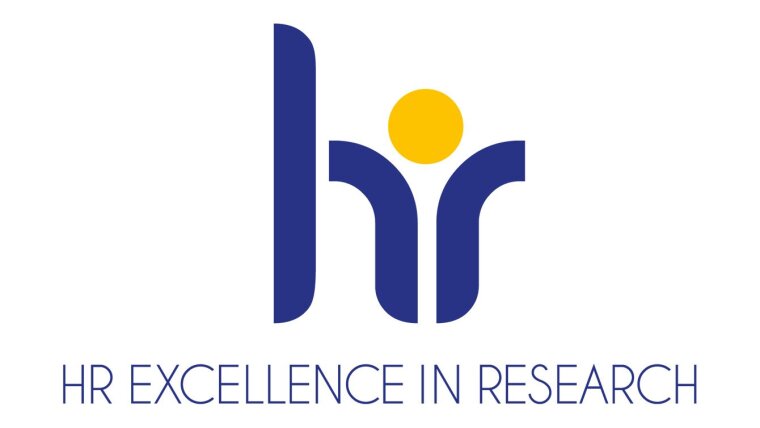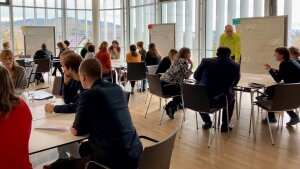
Kick-off-Workshop for the application to the label
Image: Graduate AcademyIn March 2025, the Friedrich Schiller University has received the HR Excellence in Research AwardExternal link. Since 2008, the European Commission awards this quality seal to research institutions that pursue a strategy to promote excellent working conditions for researchers (HRS4R = Human Resources Strategy for Researchers).
The award is granted on the basis of 20 quality criteria defined in the “European Charter for Researchers”. It gives institutions the opportunity to conduct a structured process for continuous further development.
-
1. Ethics, Integrity, Gender and Open Science
The first pillar is the basis for excellent research - these principles must also always be taken into account when considering the other pillars:
- Ethics and Research Integrity
Researchers should work freely, honestly and objectively and adhere to ethical standards. Institutions have the task of promoting the integrity of research (e.g. through their organizational culture, the creation of adequate structures, sanction mechanisms or education and training). - Freedom of Scientific Research
Freedom of research includes freedom of expression and opinion, the freedom to choose the object of research and the methods, to develop new theories and to contradict established opinions, as well as the freedom to publish. - Open Science
Institutions should promote and reward the following aspects of Open Science: Open data and open access publications, open software, disclosure of methods and peer review. - Gender Equality
Institutions should strive for a balanced gender ratio in research, management and administration as well as in all committees, and include gender aspects in research and teaching. In doing so, an intersectional perspective is important. - Embracing Diversity
Employers should promote diversity, combat discrimination and recognize and compensate for “unconcious bias”. A broad concept of diversity includes, among other things: Gender, race, ethnic origin, religion, social background, disability, age and sexual orientation. - The Research Profession
Employers should recognize all researchers as professionals and encourage non-linear careers. In return, researchers should behave professionally and be accountable to employers, funding bodies and society. - Free Circulation of Researchers
Employers should promote and value all forms of mobility (geographical, virtual, between institutions, disciplines and sectors) and create the necessary structures for this. - Sustainability of Research
Research activities should be implemented sustainably. To this end, institutions should strive for sustainable research management and provide further training opportunities for academics.
- Ethics and Research Integrity
-
2. Researchers’ Assessment, Recruitment and Progression
The aim is an equal, talent-based assessment of research as well as open, fair selection processes as the basis for an open labour market for researchers:
- Researchers Assessment
Qualitative assessment of research performance (peer review) should be at the centre of the system to do justice to the increasingly diverse output. All activities of researchers (including industry cooperation, teaching, science communication, management tasks, etc.) should be included and non-linear careers should be honoured. This ensures high quality standards and the integrity of research. - Recruitment
The process should be open, transparent and performance-orientated. Key objectives are excellence, gender equality and diversity. The job advertisement should include requirements, working conditions, salary, career development and a timetable, and candidates should be kept fully informed about the process at all times. - Selection
The selection process should take into account and honour all relevant experience of the candidates. Selection committees should represent a diverse range of experience and should have the necessary competences. Appropriate measures should be taken to prevent discrimination. - Career Progression
There should be regular, transparent and independent performance evaluations that take into account all the activities of the researchers. Based on this, a transparent, structured and inclusive system for academic career paths should be established (e.g. tenure track). Mobility and co-authorship should be encouraged in particular.
- Researchers Assessment
-
3. Working Conditions and Practices
The third pillar makes proposals for improving the working conditions of researchers:
- Working conditions, Funding and Salaries
The aim is to create a non-discriminatory working environment that guarantees the necessary flexibility and promotes the work-life balance of employees as well as their mental health. Institutions should provide the necessary research infrastructure (technical equipment and supporting staff). Ombudsman systems should be set up to deal with conflicts in the working environment. Researchers should be adequately represented in decision-making bodies and receive fair and attractive remuneration. - Stability of Employment
Employers should combat precarious employment relationships and restrict fixed-term contracts (maximum one third of researchers). There is a particular need for regulation for postdocs. - Contractual and Legal Obligations
Researchers should be aware of and comply with all regulations and laws relating to their work and education, as well as to the requirements of funding bodies. Institutions should provide information about this in English. Work safety and data security are particularly emphasised here. - Dissemination and Exploitation of Results
All researchers should practise open science. Results should either be used commercially or be openly available. Employers should support and recognise this and ensure that researchers at all career levels are appropriately compensated. This should be set out in an ‘intellectual assets management strategy’. In addition, researchers should be involved in science communication.
- Working conditions, Funding and Salaries
-
4. Research Careers and Talent Development
Further professional development is the basis for high-quality research and opens up a wide range of career prospects for researchers:
- Valuing Diverse Research Careers
Employers should acknowledge and support diverse careers (especially all forms of mobility). In their selection procedures and performance assessments, they should include and reward diverse skills and experiences as well as a broad spectrum of activities. Doctoral candidates and postdocs should be trained for various career paths, including non-university ones. - Career Development and Advice
Institutions should establish a career development strategy for researchers at all career stages. This should include individual career development, mentoring and career counselling. - Continuous Professional Development
Institutions should offer programmes (e.g. further education, workshops, e-learning, etc.) to researchers for continuous further development and regularly evaluate their effectiveness. Skills for non-university careers should also be taught. Teaching should be appreciated and supported. At the same time, special attention should be paid to ensure that teaching activities are compatible with research, especially for doctoral researchers and postdocs. - Supervision and Mentoring
A fair, non-discriminatory management culture should be established that facilitates a cooperative way of working and an inspiring, healthy working atmosphere. Institutions should ensure that doctoral candidates and postdocs have clearly defined contact persons/supervisors who have the necessary time and competences for this task. Supervision should include structured regular meetings or feedback sessions and provide a broad level of support.
- Valuing Diverse Research Careers

Johannisstraße 13
07743 Jena Google Maps site planExternal link


